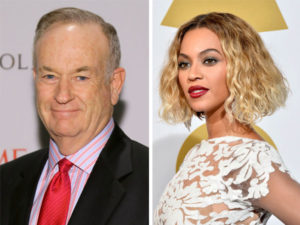
O’Reilly sat down with TV talk show host David Letterman on Friday night where the topic of a recent interview he conducted on his own show, “The O’Reilly Factor,” surfaced.
Letterman’s question “Have you ever made anyone cry on your show” quickly transformed their interview into a debate about popular music and the responsibility of entertainers like Knowles.
“Russell Simmons this week almost cried,” O’Reilly answered.
“Is this when you were talking about Beyonce?” Letterman asked.
During the interview-turned-debate, O’Reilly echoed the sentiments he had made about the singer during the interview with entertainment mogul Simmons.
O’Reilly, who stood by his original statements that Beyonce is peddling artistry that is too “raunchy” and inappropriate for “impressionable children,” namely her Partition video, was met with more inclusive commentary from Letterman, who conceded that Beyonce is only one part of the industry that is collectively guilty of pushing the envelope on society’s sensitivity toward sexual references.
“If you are going to select this as a category to be critical about, it’s not Beyonce, this has been going on for the last 40 or 50 years, Letterman said. “What about that Miley Cyrus, naked on that [wrecking ball] what about that?”
O’reilly, who claimed he didn’t know about Cyrus’ video, turned the conversation back to Beyonce, suggesting that the money she earns exempts her from needing to be “hyper-sexual” for entertainment.
“She has $350 million in the bank according to Forbes, she doesn’t have to do this,” O’Reilly said.
He then goes on to note that the music of today is drastically different from the music of America when he was growing up, remembering the days of Motown he says, “That was good uplifting stuff, right? What happened to that?”
Letterman pointed out that as entertainment evolves, every generation has raised the same questions about cultural appropriateness and the role of music in shaping and addressing what we think and how we display it on public platforms.
“The Rolling Stones appearing in this theatre on the Ed Sullivan show couldn’t sing “Let’s Spend the Night Together,” Letterman noted, it was considered too vulgar for that audience.
O’Reilly then added another dimension to his argument in which he pointed to the growing rate of unwed mothers in the Black community, and surmised that it is directly related to young girls in the Black community internalizing and acting out images they are seeing in Beyonce videos.
“Right now in the African-American community 72 percent of babies are born out of wedlock, back when Motown was hot in the ’60s it was like 10 or 12 percent. So what we are seeing is a deleterious effect on American society and I’m saying to somebody like Beyonce, look these girls love you, they idolize you, you have all the money you need you are very talented. Do some uplifting stuff, you’ll sell as many records.”
Letterman concluded the short debate by saying Beyonce should not be singled out as there are many in the industry who are doing similar work.


